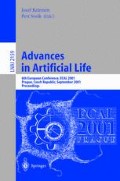Abstract
Division of labour in ant societies is a kind of role model for distributed problem solving. They are so because ants are simple, non-cognitive, distributed and autonomous and yet they solve an optimisation problem that is very complex and dynamic. This is very desirable in computer science, but as of yet not much research has gone into explaining the underlying mechanisms of division of labour. The venue in this paper is to, by means of evolutionary algorithms, find the implications spatial constraints play in the division of labour in a foraging task of virtual ants. The ants differ only in size, and size implies constraints regarding to ease of movement in an environment where obstacles of other ants and clay exists. The results show that spatial constraints do play a major role in the job-task division evolved, in that test setup with increasing constraints exhibited division of labour in that ants of different sizes occupy different spatial areas of the task domain. In the process, we have evolved the behaviour of the ants that underlie the division of labour. This was done via mapping functions and motivation networks.
Access this chapter
Tax calculation will be finalised at checkout
Purchases are for personal use only
Preview
Unable to display preview. Download preview PDF.
References
Bonabeau, E. 1999. Swarm Intelligence, From Natural to Artificial Systems. Oxford University Press.
Bourke, A.F.G. & Franks, N.R. 1995. Chapter 12. Social evolution in Ants. Monographs In Behavior And Ecology. Princeton.
McDonald, P. & H. Topoff. 1985. Social regulation of behavioral development in the ant. Journal of Comparative Psychology 99: 3–14.
Wilson, E.O. 1985a. Between-caste aversion as a basis for division of labour in the ant Pheidole pubiventris.
Wilson, E.O. 1985b. The principles of caste evolution. Behavioral Ecology and Sociobiology 16: 89–98.
Krink T. 1999. Cooperation and Selfishness in Strategies for Resource Management. Marine Environmental Modeling Seminar, Lillehammer, Norway.
Tofts, C. & N.R. Franks. 1992. Doing the right thing: ants, honeybees and naked molerats. Trends in Ecology and Evolution 7:346–349.
Tofts, C. 1993. Algorithm for task allocation in ants (A study of temporal polyetism). Bulletin of Mathematical Biology 55:891–918.
Ferber, J. 1999. Multi-agent Systems-an introduction to distributed artificial intelligence. Addison Wesley.
Author information
Authors and Affiliations
Editor information
Editors and Affiliations
Rights and permissions
Copyright information
© 2001 Springer-Verlag Berlin Heidelberg
About this paper
Cite this paper
Larsen, J. (2001). Division of Labour in Simulated Ant Colonies Under Spatial Constraints. In: Kelemen, J., Sosík, P. (eds) Advances in Artificial Life. ECAL 2001. Lecture Notes in Computer Science(), vol 2159. Springer, Berlin, Heidelberg. https://doi.org/10.1007/3-540-44811-X_36
Download citation
DOI: https://doi.org/10.1007/3-540-44811-X_36
Published:
Publisher Name: Springer, Berlin, Heidelberg
Print ISBN: 978-3-540-42567-0
Online ISBN: 978-3-540-44811-2
eBook Packages: Springer Book Archive

